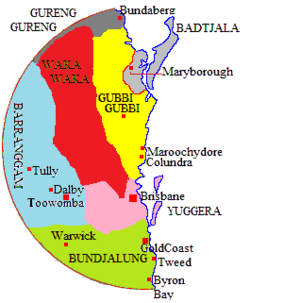Wakka Wakka facts for kids
The Wakka Wakka (also spelled Waka Waka) people are an Aboriginal Australian community from the state of Queensland, Australia. They have a rich history, unique language, and strong connection to their traditional lands.
Contents
What Does "Wakka" Mean?
The word "Wakka" means "no" in the Wakawaka language. Early Western linguists, who studied the language, noted this meaning. Many Aboriginal groups in the area, like the nearby Gubbi Gubbi, used words like "no" in their names to help tell different groups apart.
The Wakka Wakka Language
The Wakka Wakka language is part of the Waka–Kabic branch of the larger Pama-Nyungan language family. Important work by people like John Mathew and Nils Holmer helped save parts of the language's grammar and vocabulary.
Today, there are exciting efforts to bring the Wakka Wakka language back to life and make sure it doesn't disappear. For example, Eidsvold State School has teamed up with community members to teach Wakka Wakka lessons to primary school students. This project involves teachers like Lachlan Mackenzie and respected elders like Aunty Doris from the Eidsvold Wakka Wakka Group.
Traditional Lands of the Wakka Wakka People

According to researcher Norman Tindale, the traditional lands of the Wakka Wakka people covered about 4,100 square miles (10,619 square kilometers). These lands stretched north from Nanango to the area around Mount Perry. To the west, their country reached the Boyne River, the upper Burnett River, and Mundubbera. They also lived in areas like Kingaroy, Murgon, and Gayndah.
Native Title Recognition
After a long legal journey of 25 years, the Wakka Wakka people received Native Title recognition on April 12, 2022. This means they were legally recognized as the traditional owners of 114,000 hectares of land in the Burnett region. A very important spiritual and cultural place for the Wakka Wakka people, Ban Ban Springs, was included in this title. Because their traditional lands are so large, more Native Title recognitions are expected in the future.
A Glimpse into Wakka Wakka History
In the early 1900s, many Wakka Wakka and Gubbi Gubbi people, along with other groups from Queensland, were moved to the Barambah Aboriginal Mission near Murgon. This mission later became the town of Cherbourg, which is now managed by the Cherbourg Aboriginal Shire Council.
The Wakka Wakka people have many significant sites across their territory. These include Ban Ban Springs, Barambah Creek, a sacred area near Maidenwell, and places in the foothills of the Bunya Mountains. There are also several ancient bora rings (special ceremonial grounds) that have survived.
Before Europeans arrived, the Wakka Wakka people were among the many groups who regularly gathered for important bunya nut feasts in the Bunya Mountains and other large meetings in the South Burnett region.
Other Names for the Wakka Wakka People
The Wakka Wakka people have been known by several other names, including:
- Mungar (meaning "Spotted gum tree people")
- Nukunukubara(?)
- Wa:bar. (a name used for several tribes)
- Waa
- Waka
- Wakaa
- Wakar, Wakkar, Wackar
- Wakkawakka
- Wakuwuka
- Wapa. (a name given by the Kabikabi people, meaning "inlanders")
- Woga
- Wogga
- Wuka Wuka
 | Sharif Bey |
 | Hale Woodruff |
 | Richmond Barthé |
 | Purvis Young |

